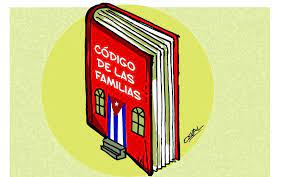
Just a few days separate us from the celebration of the popular referendum on the Family Code, on September 25. The route to this point has been long, and the reflection of struggles, differences, dialogues and plural realities. However, it is a path that, far from ending, begins.
A diverse and inclusive Cuba, guided by respect, love, justice and affection, spirituality and harmony, was shaped in this legislative text.
Its collective construction derived, perhaps as few times, in an educational, legal, political, cultural and ethical exercise, core for the nation.
The experience of the constitutional debate that the Magna Carta of 2019 bequeathed us had already shown the strength of popular participation in achieving the norms that influence the life and development of all people.
The Family Code not only followed that spirit of arguing with rights and seeking consensus in the broad popular consultation process. Its articles have the merit of consistency from beginning to end, and of guarding and respecting the spirit of a Constitution that places human dignity and social justice at the center of its values.
No Cuban, whether or not they have read the text, agrees with it or not, is unaware of the Family Code.
It cannot be because the rights of some also affect others, and this is a proposal focused on expanding them and not on maintaining privileges.
What is being debated this September 25, when citizens go to the polls to exercise their democratic right to a free vote, is not simply a law.
It is the possibility that a norm focuses on the social and family heterogeneity of a country and, consequently, protects the vulnerability that can arise from it and justice and equity prevail.
It is the opportunity to begin to dismantle social constructions and cultural imaginaries, anchored from the patriarchal ideology, as an exclusive norm of the family organization. The patriarchal culture establishes power imbalances in the family sphere and these imbalances point against consensus. If we do not consider that all people are on the same level, then we cannot reach consensus and the will of some would prevail over others.
The Code provides tools for the family members themselves to better organize family life from a harmonic, consensus perspective; and if they have to resolve these conflicts in the first place, it must be in the family sphere.
This September 25 we will have before us the privilege of being able to place the highest interest of human dignity—which transcends age, race, gender, sexual orientation or any other distinction—, pending justice and love, above creeds and ideologies.We will be contributing so that the power relations that are logically reproduced in a society are dignified, affectionate, based on rights and responsibilities, committed to personal and common well-being.
We will have the challenge of placing respect and empathy among the values that guide us from day to day.
To give voice to people and realities that have always been there, silenced within the family context itself.
To recognize the great diversity of models that make up the family fabric of Cuba today, and protect them and guarantee their protection.
To put a grain of sand in that effort so that happiness prevails and not the stories of violence, mistreatment and discrimination that, at some point in our lives, have become close to us all.
To bet on healing, banish blame, embrace communication, dialogue, the valorization of effort and care.
On September 25, you not only vote, you can create; choose to make affections the horizon, which is reached with authority, without authoritarianism; with responsibility without possession, with limits without violence, with rights without exclusions.
A YES to the Family Code is a vote for love, affection, justice, rights. That is why Cubadebate is on the YES side.




